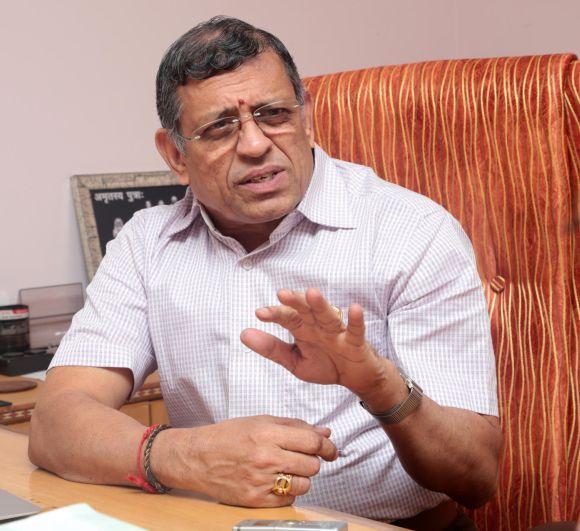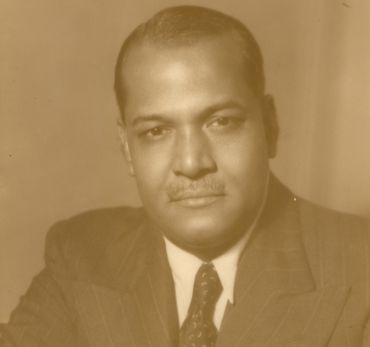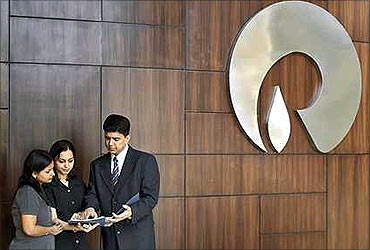Photographs: Sreeram Selvaraj/Rediff.com Shobha Warrier
After charges against Bharatiya Janata Party President Nitin Gadkari were splashed by the TV channels, one person who was seen most on TV was Chartered Accountant S Gurumurthy. He was seen coming out of senior BJP leader L K Advani's house and was seen meeting other top BJP leaders. He was also seen outside Nitin Gadkari's house.
After studying all the documents connected with Gadkari's Purti group, Gurumurthy gave him a clean chit.
Except tweeting about his findings, he refused to talk to the press.
In the first part of this exclusive interview to rediff.com's Shobha Warrier, Gurumurthy talks about how he, a chartered accountant, became an investigative journalist and a writer.
The second part of the interview will focus on why he gave a clean chit to Nitin Gadkai.
In what way did your childhood and education shape your life and philosophy?
My influence was my home, my mother. My mother brought us up with such sincerity and commitment to the family after my father passed away when I was just five. She really struggled and made even papads to bring us up. There were days when there was no food at home but my mother fed me even when she stayed hungry.
The only thing she taught us through her behaviour was that we be honest and sincere, and have faith in God. She was the greatest influence on me.
Next person who influenced me was Kanchi Maha swami.
Where did you get your education?
I grew up in a village which is about 100 km from Chennai. I got my school education in the village, and it was in Tamil medium. When I came to Chennai to do college, I was at sea because I saw everyone talking in English, and I didn't know how to put one sentence together.
Here, I must say the monks of Ramakrishna Ashram (I studied at the Vivekananda College) took a lot of interest in me. In three-four months I picked up the language.
...
Meeting Ramnath Goenka
Image: Newspaper publisher Ramnath Goenka who launched The Indian ExpressWere you a good student?
I was always good at studies. Even though our financial status was not good, I used to get books from somewhere and read a lot. My brothers were factory workers. So, we had a marginal existence.
I also developed a great love for the country which was a part of my upbringing. I saw this country as God which I cannot explain rationally.
It is said that you wanted to pursue law but did Chartered Accountancy. Is it true?
Yes, I wanted to study law but I didn't have any recommendations. So, I took to chartered accountancy. I passed out both intermediate and final examinations with All India ranking. But I didn't go looking for employment.
Why?
Mine was a joint family and I was the only educated person in the family. I felt there was no point in me alone coming up. Unless I was independent to do practice, I knew I would not be able to help my entire family.
Initially, I worked with two chartered accounts firms where I gained enormous experience. My interest transcended into law and a variety of allied subjects.
Gaurikanthan Company, where I was working, was auditing The Indian Express.
So, that was how you met Ramnath Goenka?
Those were the days of the Emergency and not many people were willing to help The Indian Express. I prepared a very detailed plan on how The Indian Express could tackle the various legal issues they were facing at that time. That came to the notice of Ramnath Goenka. He wanted to know 'who this Gurumurthy was'. He then asked B D Goenka to meet me. I was employed with Gowrikanthan then.
Later when they offered me a job, I said, I wouldn't accept a job. Then they offered me a retainer. And that was how I came in contact with Ramnath Goenka.
...
Becoming an investigative journalist and writer
When did you meet Ramnath Goenka, and how did it change your life?
At first, my interactions with Ramnath Goenka were purely on matters of accounts, law, income tax, company law, etc. My suggestions were appreciated by him. In fact, once when I told Goenka a technical opinion of Palkhiwala was not a correct one, he sent me to Palkiwala. When I explained, Palkhiwala immediately accepted it.
Solving many problems made Goenka meet me almost on a day-to-day basis. Slowly because of my larger interest in public affairs, he began liking me a lot.
What kind of a person was he?
He was an amazing personality. He was a rich man with a poor man's qualities. He was never conscious of his wealth. His lifestyle was that of a lower middle class person.
In what way did he influence you?
There are three areas in which he influenced me.
One, how to be courageous. Second, how not to be afraid of being unpopular. Till I was arrested in 1987, and my face appeared on the front pages of all papers, I was an anonymous guy. From that day, I lost my anonymity and it was a big blow for me. Once I sat next to Mukesh Ambani in a flight and wrote an article against him and he didn't recognise me.
But after the arrest, I lost my anonymity. I didn't know how to handle popularity as I was a simple guy. It was Ramnath Goenka who gave me the mantra to handle it. He told me, 'never change your lifestyle, friends or the way you treat people'.
You are a chartered accountant. How did you become an investigative journalist and a writer?
I was always very good in drafting and writing, though writing for readers was not one of my skills. It happened sometime in May 1985. One day Ramnath Goenka asked me, 'who owns The Indian Express?' I said, you. He said, 'Guru, it's not true. Our paper is owned by Ambani'. Then he showed me 20 articles in the editorials, and I found that we had written what Reliance wanted. He then said, my paper doesn't belong to me.
He felt terrible that his paper had been invaded and his journalists had been bribed. He then wanted me to unravel what happened.
How did you conduct the investigation?
Once people know you are investigating, they will come to you with information.
Who are these people?
People from the corporate world, bureaucracy, customs departments, banks...
By August 1987, I had prepared two huge reports. By early September or so, Goenka had decided to launch an attack on Reliance. But no journalist was willing to do it as they felt no reader would read such a dry subject. Another reason they said was, as the investigation was done by me, they were not just interested in rewriting the article. Some also felt that it was not right to target a corporate company.
Then Ramnath Goenka told me to do the writing part too. That was how Gurumurthy the chartered accountant became Gurumurthy the investigative journalist and a writer.
The first four-five articles were in the name of 'Express News Service' and they created a lot of furore.
...
Association with the RSS
Does your fight with the Reliance still continue?
It is not exactly a fight with the Reliance; it is exposing the wrong doings of a particular corporate which began taking pride in achieving things by wrong means. Usually businessmen feel shy doing things through wrong means but Reliance took pride in it. They seem to say, everybody has a price and we pay the price. This transformation brought about huge erosion in morals.
Were you threatened when you started the expose?
No, there was no question of any threat.
Were you contacted by anyone?
After Ramnath Goenka passed away, and when there were problems in The Indian Express, there were attempts to reach me.
Many close friends of mine had asked me then, 'now that Goenka is not there, why do you carry on?'
Some even thought Nusli Wadia (entrepreneur) was paying me to attack Reliance. Later, when there was a problem in The Indian Express, Nusli did a campaign against me. But I never uttered a word against him.
You are described as an RSS ideologue. When did you get attracted to the RSS?
The Rashtriya Swayamsevak Sangh is one of the very important factors in my life. I came in contact with the RSS in 1971, when I was about to qualify as a chartered accountant.
RSS gave me the discipline and platform to move with all kinds of people.
How active are you now?
I was very active till 1987. After that I have not been active in the sakhas. But I maintain my association with the RSS members.
You tweeted recently that you were always honest in your opinion. How difficult is it to remain honest and have integrity when you are dealing with the corporate world and politics?
If you are content, nothing will happen to you. God has given me more than I had ever expected in life in terms of respect, friendship, acceptability and even resources. If you have the desire to have more and more things, you are finished. That is why I didn't even move from the lower middle class locality I am living in. I didn't want my lifestyle to change at all.





article